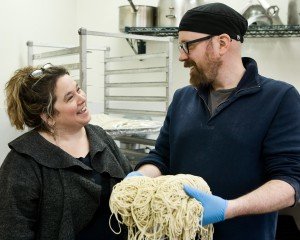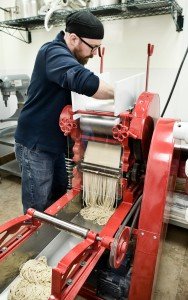By MARGIE O’LOUGHLIN
Jeff Casper and Kelly McManus are former neighbors in Longfellow, friends, and co-proprietors of a new business called Dumpling & Strand. Theirs is a business based on curiosity: they use curious ingredients, curious shapes, and curious techniques to make fresh noodles with a toothsome bite—and they make quite a lot of them.
Using the best of organic whole grains and non-GMO ingredients, Casper and McManus have created a full line of Asian, Italian and gluten free noodles. “We have ten core recipes for doughs and within each of those, we can make six different shapes,” McManus said.
“Our approach to making noodles,” McManus continued, “is that we go out into the world to find bits and pieces of cultural traditions. We come back home and make noodles that reflect Midwestern tastes and traditions, expanding the idea of what noodles can be. Our most recent noodle recipe is called ‘Wild Rice Minnesoba.’ For that noodle, we buy wild rice from the Chippewa Red Lake Band, which is Minnesota-grown and cultivated. The resulting soba noodle is beautiful: cocoa colored, rich, and has a great texture.”
 Photo right: Kelly McManus (left) and Jeff Casper (right), co-proprietors of Dumpling & Strand. Pictured with a fresh batch of ramen, they also produce three gluten-free varieties of noodles, a toasted farro fettuccine, and campanelle, mafaldine, and pici noodles made with rustic durum wheat and egg. (Photo by Margie O'Loughlin)
Photo right: Kelly McManus (left) and Jeff Casper (right), co-proprietors of Dumpling & Strand. Pictured with a fresh batch of ramen, they also produce three gluten-free varieties of noodles, a toasted farro fettuccine, and campanelle, mafaldine, and pici noodles made with rustic durum wheat and egg. (Photo by Margie O'Loughlin)
Casper and McManus come from very different, but complementary, backgrounds which gives added strength to their partnership. Casper is a food scientist with nearly 20 years of experience specializing in grains for large companies like General Mills, Pillsbury, and Cargill. McManus is a graphic designer with strong skills in the area of brand development. She has also owned and managed a high-end flower shop, and worked as a producer in an animation studio. Both say they have a broad entrepreneurial streak.
The name of their business speaks to evolution and change. The original noodle in China was the dumpling: a pulled piece of dough, boiled in water. As dumplings evolved over time, they elongated into strands of dough that were thin and graceful. The name Dumpling & Strand seems to say it all...
In the relatively short time since Casper and McManus started their business, they’ve already seen quite a lot of change. Dumpling & Strand launched at the Kingfield Farmer’s Market in May 2016 with their fresh ramen noodles. In December 2016, they got picked up by a distributor and now have noodles available for sale in 25 co-ops and natural food stores in five states. They just celebrated their first year of noodle making at Gia Kitchens,1222 MacKubin Street in St. Paul.
When asked about future noodling, McManus said, “We’d like to continue having product available in more stores and restaurants. Currently, if you’d like to try our noodles, the Birchwood Cafe uses our toasted basmati fettuccine in their carbonara. The Riverview Wine Bar also has us on their menu, and you can find Dumpling and Strand in the refrigerated section at the Seward Co-op. As a Longfellow resident for almost 15 years, that makes me happy.”
 Photo right: Casper produced fresh ramen noodles on Dumpling and Strand’s vintage noodle cutting machine. (Photo by Margie O'Loughlin)
Photo right: Casper produced fresh ramen noodles on Dumpling and Strand’s vintage noodle cutting machine. (Photo by Margie O'Loughlin)
“We’re excited about the idea of partnering with small farmers in Minnesota,” McManus added, “to plant unique and sustainable grains like kernza: a perennial form of wheat. Because it doesn’t have to be reseeded every year, water run-off, erosion from tilling, and the need for fertilizers are all greatly reduced.”
“Our stance is that fresh ingredients are always better. We use only fresh milled grains for our noodles” she said. “As a consumer, you will find ours to be a very different product than a bag of dried noodles made from old flour that’s been shipped across the country. Just like coffee, wine or cheese, people are starting to see grains in new, expanded ways.”
Last but not least, McManus answered the question that crosses every noodle maker’s mind at some point—the question for which apparently there is an expert, definitive answer.
After cooking their fresh noodles for 2-3 minutes in rapidly boiling water, should they be rinsed? The answer is, “Yes,” unless finishing in a saucepan with oil. In McManus’ words, “Rinsing tightens everything up; you should do it.”
After cooking their fresh noodles for 2-3 minutes in rapidly boiling water, should they be rinsed? The answer is, “Yes,” unless finishing in a saucepan with oil. In McManus’ words, “Rinsing tightens everything up; you should do it.”
Comments
No comments on this item Please log in to comment by clicking here